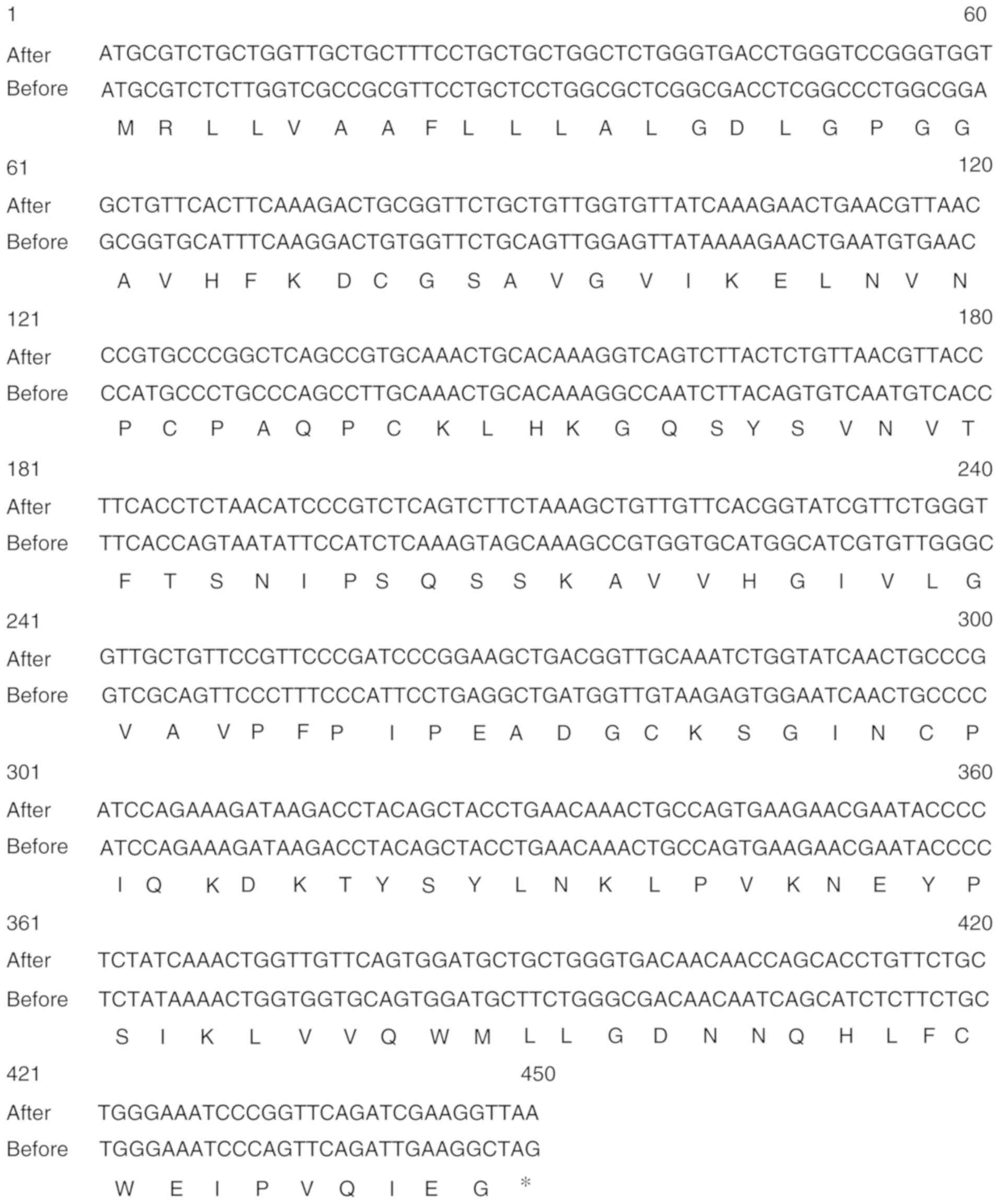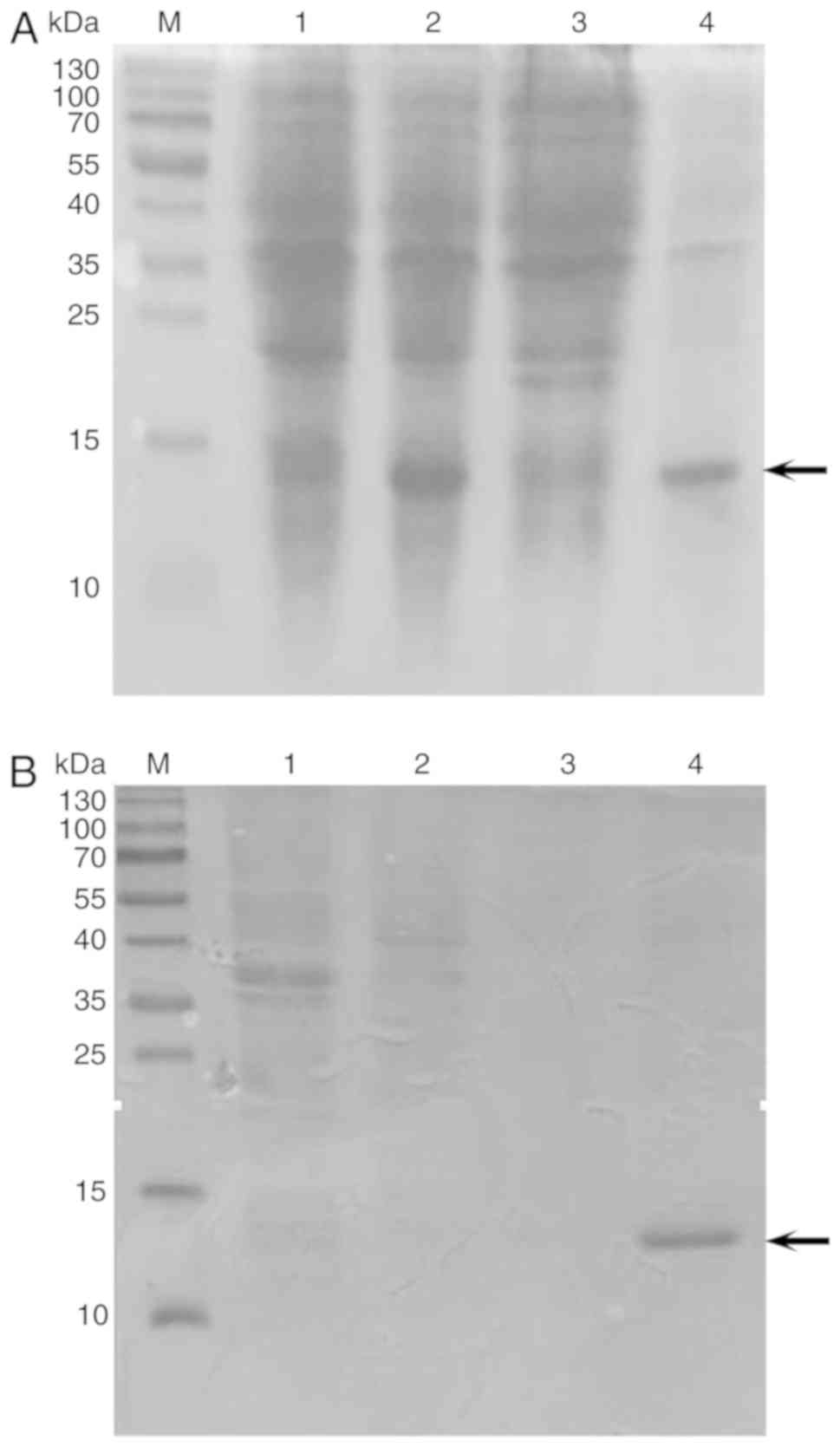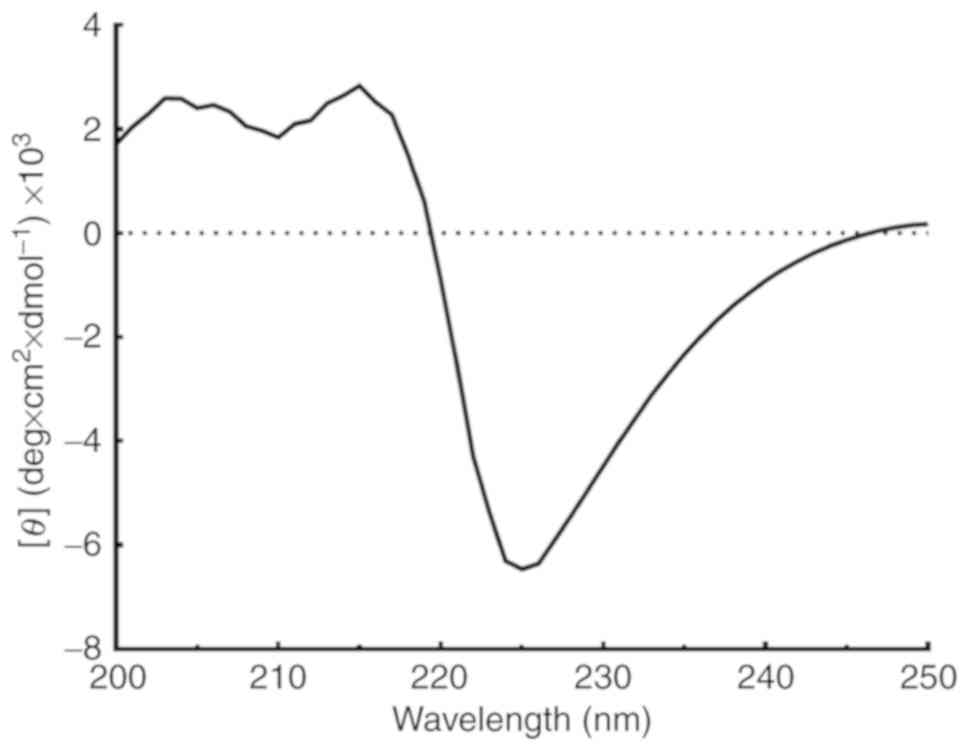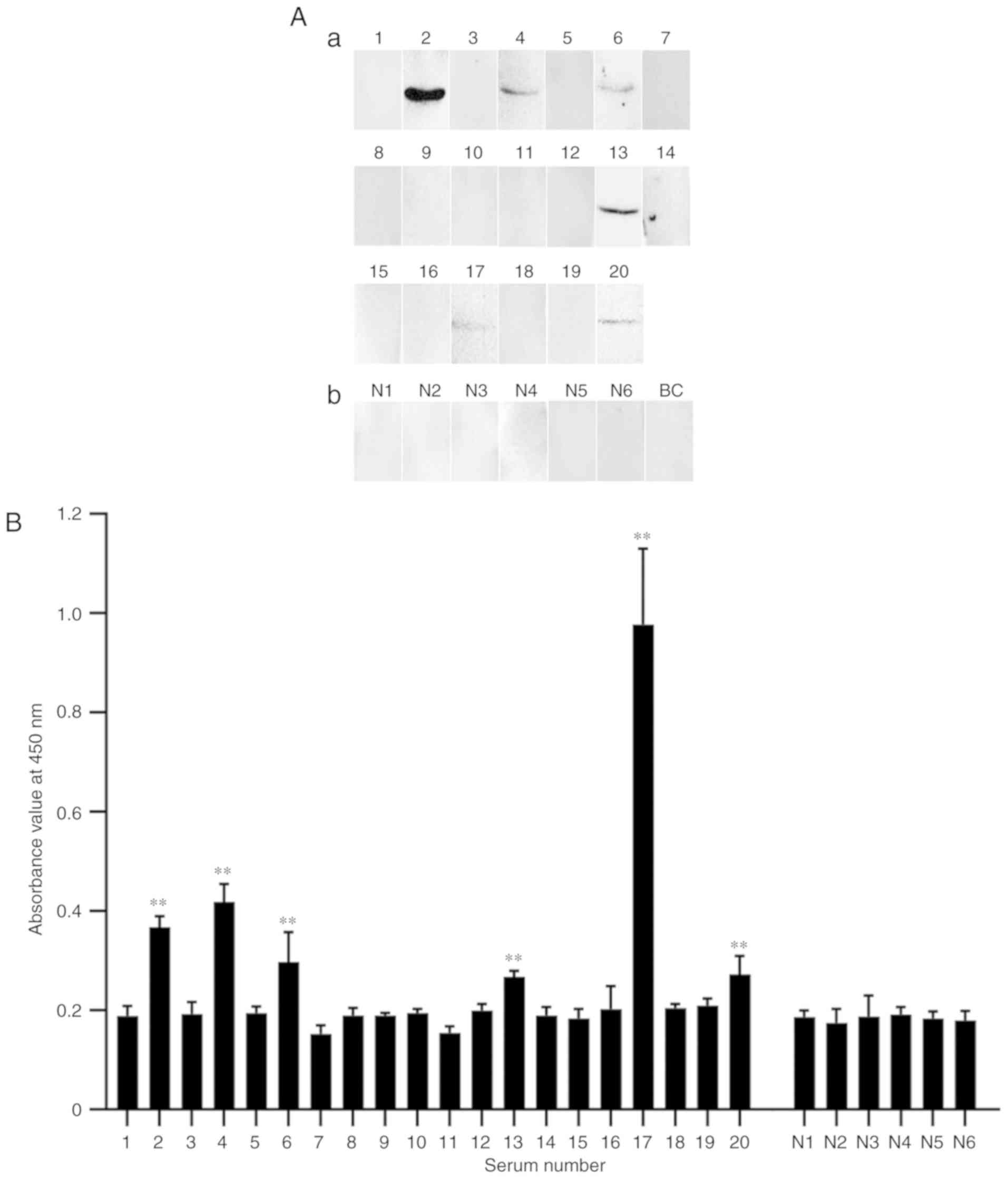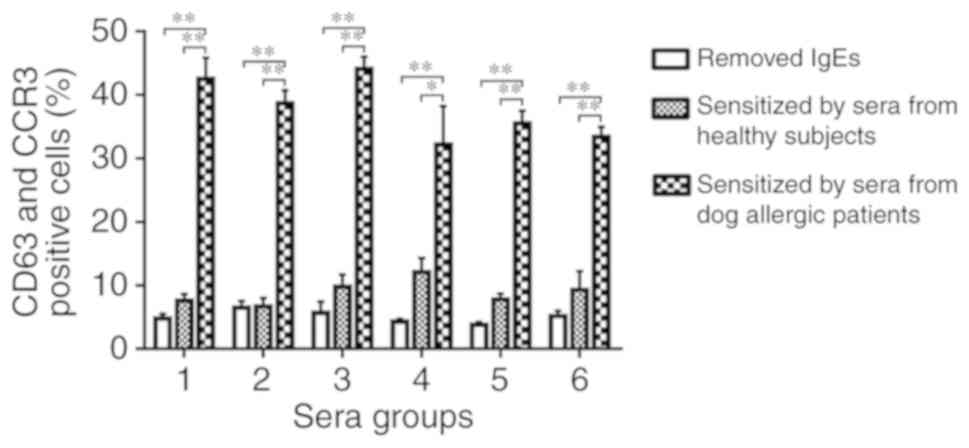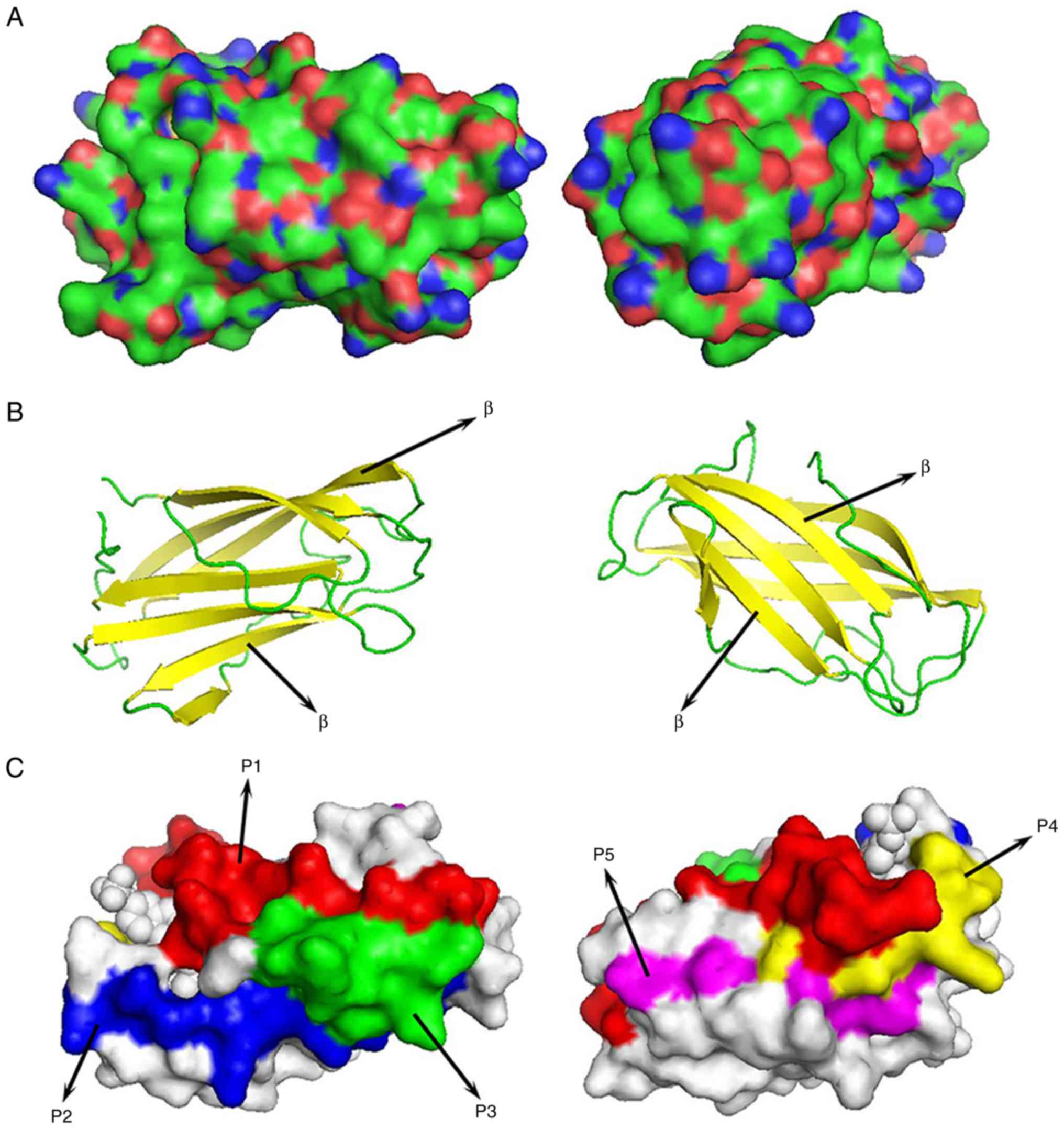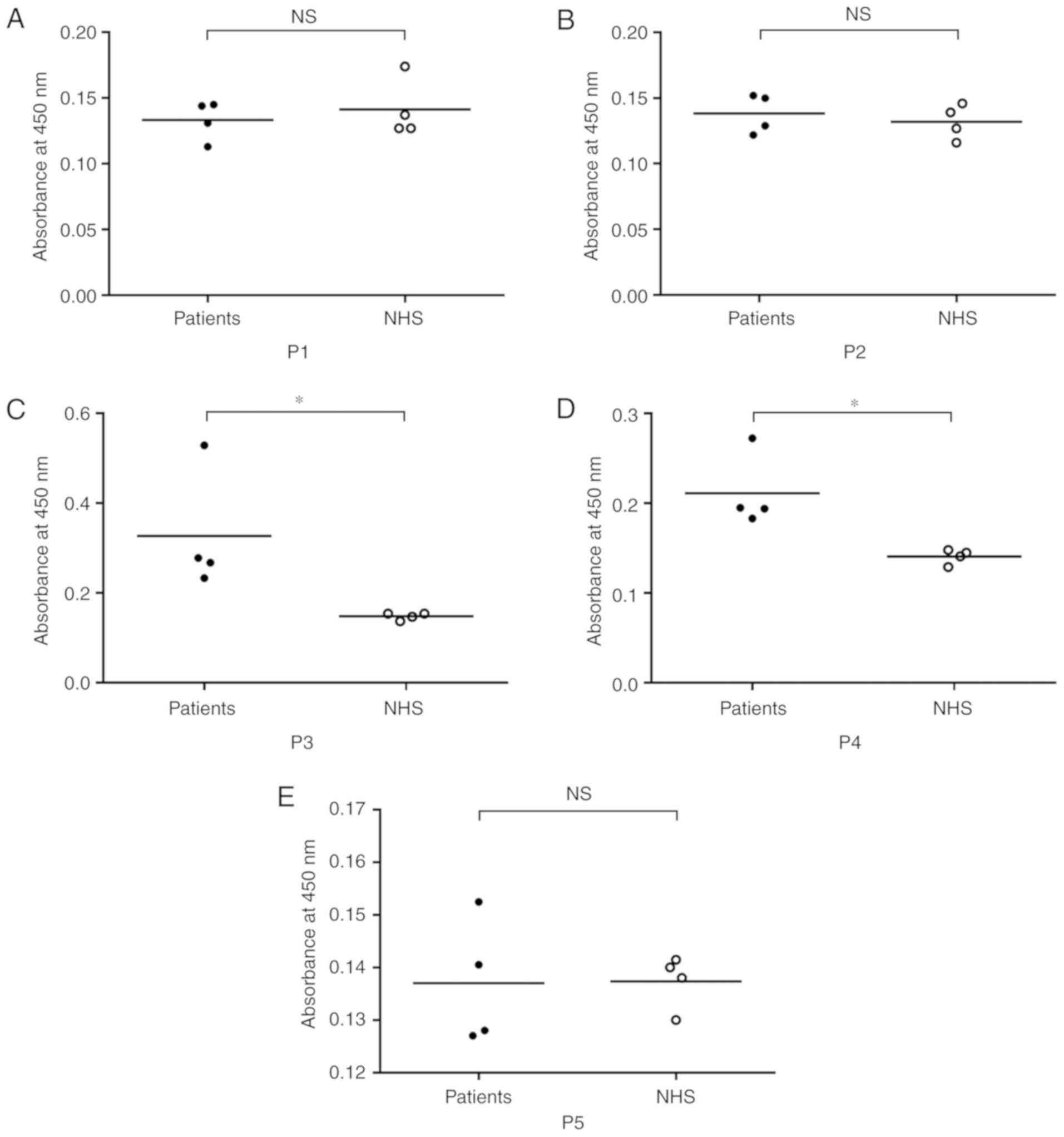|
1
|
Konradsen JR, Fujisawa T, van Hage M,
Hedlin G, Hilger C, Kleine-Tebbe J, Matsui EC, Roberts G, Rönmark E
and Platts-Mills TA: Allergy to furry animals: New insights,
diagnostic approaches, and challenges. J Allergy Clin Immunol.
135:616–625. 2015. View Article : Google Scholar
|
|
2
|
Nilsson OB, Hage MV and Grönlund H:
Mammalian-derived respiratory allergens-Implications for diagnosis
and therapy of individuals allergic to furry animals. Methods.
66:86–95. 2014. View Article : Google Scholar
|
|
3
|
Wang YJ, Li L, Song WJ, Zhou YJ, Cao MD,
Zuo XR and Wei JF: Canis familiaris allergen Can f 6: Expression,
purification and analysis of B-cell epitopes in Chinese dog
allergic children. Oncotarget. 8:90796–90807. 2017.PubMed/NCBI
|
|
4
|
Polovic N, Wadén K, Binnmyr J, Hamsten C,
Grönneberg R, Palmberg C, Milcic-Matic N, Bergman T, Grönlund H and
van Hage M: Dog saliva-an important source of dog allergens.
Allergy. 68:585–592. 2013. View Article : Google Scholar :
|
|
5
|
Vredegoor DW, Willemse T, Chapman MD,
Heederik DJJ and Krop EJM: Can f 1 levels in hair and homes of
different dog breeds: Lack of evidence to describe any dog breed as
hypoallergenic. J Allergy Clin Immunol. 130:904–909.e7. 2012.
View Article : Google Scholar : PubMed/NCBI
|
|
6
|
Burbach GJ, Heinzerling LM, Edenharter G,
Bachert C, Bindslev-Jensen C, Bonini S, Bousquet J,
Bousquet-Rouanet L, Bousquet PJ, Bresciani M, et al: GA(2)LEN skin
test study II: Clinical relevance of inhalant allergen
sensitizations in Europe. Allergy. 64:1507–1515. 2009. View Article : Google Scholar : PubMed/NCBI
|
|
7
|
Schmitz R, Ellert U, Dahm S and Thamm M:
Patterns of sensitization to inhalant and food allergens-findings
from the german health interview and examination survey for
children and adolescents. Int Arch Allergy Immunol. 162:263–270.
2013. View Article : Google Scholar
|
|
8
|
Asarnoj A, Ostblom E, Kull I, Lilja G,
Pershagen G, Hedlin G, van Hage M and Wickman M: Sensitization to
inhalant allergens between 4 and 8 years of age is a dynamic
process: results from the BAMSE birth cohort. Clin Exp Allergy.
38:1507–1513. 2008. View Article : Google Scholar : PubMed/NCBI
|
|
9
|
Schou C, Svendsen UG and Løwenstein H:
Purification and characterization of the major dog allergen, Can f
1. Clin Exp Allergy. 21:321–318. 1991. View Article : Google Scholar : PubMed/NCBI
|
|
10
|
Basagaña M, Luengo O, Labrador M, Garriga
T, Mattsson L, Lidholm J and Cardona V: Component-resolved
diagnosis of dog allergy. J Investig Allergol Clin Immunol.
27:185–187. 2017. View Article : Google Scholar : PubMed/NCBI
|
|
11
|
Mattsson L, Lundgren T, Everberg H,
Larsson H and Lidholm J: Prostatic kallikrein: A new major dog
allergen. J Allergy Clin Immunol. 123:362–368.e363. 2009.
View Article : Google Scholar : PubMed/NCBI
|
|
12
|
Kamata Y, Miyanomae A, Nakayama E,
Miyanomae T, Tajima T, Nishimura K, Tada T and Hoshi H:
Characterization of dog allergens Can f 1 and Can f 2. 2. A
comparison of Can f 1 with Can f 2 regarding their biochemical and
immunological properties. Int Arch Allergy Immunol. 142:301–308.
2007. View Article : Google Scholar
|
|
13
|
Mattsson L, Lundgren T, Olsson P, Sundberg
M and Lidholm J: Molecular and immunological characterization of
Can f 4: A dog dander allergen cross-reactive with a 23 kDa
odorant-binding protein in cow dander. Clin Exp Allergy.
40:1276–1287. 2010. View Article : Google Scholar : PubMed/NCBI
|
|
14
|
Nilsson OB, Binnmyr J, Zoltowska A, Saarne
T, Hage MV and Grönlund H: Characterization of the dog lipocalin
allergen Can f 6: The role in cross-reactivity with cat and horse.
Allergy. 67:751–757. 2012. View Article : Google Scholar : PubMed/NCBI
|
|
15
|
Khurana T, Newmanlindsay S, Young PR and
Slater JE: The NPC2 protein: A novel dog allergen. Ann Allergy
Asthma Immunol. 116:440–446. 2016. View Article : Google Scholar : PubMed/NCBI
|
|
16
|
Luo S, Sun Y, Hou J, Kong X, Wang P, Zhang
Q and Sundell J: Pet keeping in childhood and asthma and allergy
among children in Tianjin area, China. PLos One. 13:e01972742018.
View Article : Google Scholar : PubMed/NCBI
|
|
17
|
Li J, Sun B, Huang Y, Lin X, Zhao D, Tan
G, Wu J, Zhao H, Cao L and Zhong N; China Alliance of Research on
Respiratory Allergic Disease: A multicentre study assessing the
prevalence of sensitizations in patients with asthma and/or
rhinitis in China. Allergy. 64:1083–1092. 2009. View Article : Google Scholar : PubMed/NCBI
|
|
18
|
Gao Q, Ren YX, Liu YG, Ma L, Gu XH, Zhang
WX, Liu L, Zhai XJ, Xiang L and Shen KL: Allergy march of Chinese
children with infantile allergic symptoms: A prospective
multi-center study. World J Pediatr. 13:1–6. 2017. View Article : Google Scholar
|
|
19
|
Negi SS and Braun W: Cross-React: A new
structural bioinformatics method for predicting allergen
cross-reactivity. Bioinformatics. 33:1014–1020. 2017.PubMed/NCBI
|
|
20
|
Feng Y, Lin H and Luo L: Prediction of
protein secondary structure using feature selection and analysis
approach. Acta Biotheor. 62:1–14. 2013. View Article : Google Scholar : PubMed/NCBI
|
|
21
|
Fanuel S, Tabesh S, Sadroddiny E and
Kardar GA: Analysis of predicted B and T-cell epitopes in Der p 23,
allergen from Dermatophagoides pteronyssinus. Bioinformation.
13:307–312. 2017. View Article : Google Scholar : PubMed/NCBI
|
|
22
|
Curin M, Weber M, Hofer G, Apostolovic D,
Keller W, Reininger R, Swoboda I, Spitzauer S, Focke-Tejkl M, van
Hage M and Valenta R: Clustering of conformational IgE epitopes on
the major dog allergen Can f 1. Sci Rep. 7:121352017. View Article : Google Scholar : PubMed/NCBI
|
|
23
|
Griffiths RLM, El-Shanawany T, Jolles SRA,
Selwood C, Heaps AG, Carne EM and Williams PE: Comparison of the
performance of skin prick, immunocap, and isac tests in the
diagnosis of patients with allergy. Int Arch Allergy Immunol.
172:215–223. 2017. View Article : Google Scholar : PubMed/NCBI
|
|
24
|
Xue F, Guo H, Hu Y, Liu R, Huang L, Lv H,
Liu C, Yang M and Ma L: Expression of codon-optimized plant
glycosyltransferase UGT72B14 in escherichia coli enhances
salidroside production. Biomed Res Int. 2016:98459272016.
View Article : Google Scholar : PubMed/NCBI
|
|
25
|
Ni WW, Huang W, Wu DQ, Zhou YJ, Ji CM, Cao
MD, Guo M, Sun JL and Wei JF: Expression and purification of a
major allergen, Pla a 1, from Platanus acerifolia pollen and the
preparation of its monoclonal antibody. Mol Med Rep. 16:2887–2892.
2017. View Article : Google Scholar : PubMed/NCBI
|
|
26
|
Louis-Jeune C, Andrade-Navarro MA and
Perez-Iratxeta C: Prediction of protein secondary structure from
circular dichroism using theoretically derived spectra. Proteins.
80:374–381. 2012. View Article : Google Scholar
|
|
27
|
Sanz ML, Gamboa PM, Antépara I, Uasuf C,
Vila L, Garcia-Avilés C, Chazot M and De Weck AL: Flow cytometric
basophil activation test by detection of CD63 expression in
patients with immediate-type reactions to betalactam antibiotics.
Clin Exp Allergy. 32:277–286. 2002. View Article : Google Scholar : PubMed/NCBI
|
|
28
|
Wallowitz ML, Chen RJ, Tzen JT and Teuber
SS: Using human basophil donors to assess the clinical relevance of
sesame 11S Globulin, Ses i 6. J Allergy Clin Immunol. 117:S50.
2006. View Article : Google Scholar
|
|
29
|
Wallowitz ML, Chen RJ, Tzen JT and Teuber
SS: Ses i 6, the sesame 11S globulin, can activate basophils and
shows cross-reactivity with walnut in vitro. Clin Exp Allergy.
37:929–938. 2007. View Article : Google Scholar : PubMed/NCBI
|
|
30
|
An S, Ma D, Wei JF, Yang X, Yang HW, Yang
H, Xu X, He S and Lai R: A novel allergen Tab y 1 with inhibitory
activity of platelet aggregation from salivary glands of
horseflies. Allergy. 66:1420–1427. 2011. View Article : Google Scholar : PubMed/NCBI
|
|
31
|
Wei JF, Yang H, Li D, Gao P and He S:
Preparation and identification of Per a 5 as a novel American
cockroach allergen. Mediators Inflamm. 2014:5914682014. View Article : Google Scholar : PubMed/NCBI
|
|
32
|
Garcia OP and Marin A: Usefulness of the
basophil activation test (BAT) in the diagnosis of life-threatening
drug anaphylaxis. Allergy. 65:1204. 2010.
|
|
33
|
Arnold K, Bordoli L, Kopp J and Schwede T:
The SWISS-MODEL workspace: A web-based environment for protein
structure homology modelling. Bioinformatics. 22:195–201. 2006.
View Article : Google Scholar
|
|
34
|
Kiefer F, Arnold K, Künzli M, Bordoli L
and Schwede T: The SWISS-MODEL Repository and associated resources.
Nucleic Acids Res. 37:387–392. 2009. View Article : Google Scholar
|
|
35
|
Krogh A, Larsson B, Von HG and Sonnhammer
EL: Predicting transmembrane protein topology with a hidden Markov
model: Application to complete genomes. J Mol Biol. 305:567–580.
2001. View Article : Google Scholar : PubMed/NCBI
|
|
36
|
Bramucci E, Paiardini A, Bossa F and
Pascarella S; PyMod: Sequence similarity searches, multiple
sequence-structure alignments, and homology modeling within PyMOL.
Bmc Bioinformatics. 13(Suppl 4): pp. S22012, View Article : Google Scholar :
|
|
37
|
Ni WW, Wang LB, Zhou YJ, Cao MD, Huang W,
Guo M, Ji CM, Sun JL and Wei JF: Expression, purification and
epitope analysis of Pla a 3 allergen from Platanus acerifolia
pollen. Mol Med Rep. 16:2851–2255. 2018. View Article : Google Scholar
|
|
38
|
Chen H, Yang HW, Wei JF and Tao AL: In
silico prediction of the T-cell and IgE-binding epitopes of Per a 6
and Bla g 6 allergens in cockroaches. Mol Med Rep. 10:2130–3136.
2014. View Article : Google Scholar : PubMed/NCBI
|
|
39
|
Li X, Yang HW, Chen H, Wu J, Liu Y and Wei
JF: In Silico prediction of T and B cell epitopes of Der f 25 in
Dermatophagoides farinae. Int J Genomics. 2014:4839052014.
View Article : Google Scholar : PubMed/NCBI
|
|
40
|
Yang H, Chen H, Jin M, Xie H, He S and Wei
JF: Molecular cloning, expression, IgE binding activities andin
silicoepitope prediction of Per a 9 allergens of the American
cockroach. Int J Mol Med. 38:1795–1805. 2016. View Article : Google Scholar : PubMed/NCBI
|
|
41
|
Tong X, Guo M, Jin M, Chen H, Li Y and Wei
JF: In silico epitope prediction, expression and functional
analysis of Per a 10 allergen from the American cockroach. Int J
Mol Med. 38:1806–1814. 2016. View Article : Google Scholar : PubMed/NCBI
|
|
42
|
Bublin M, Kostadinova M, Radauer C, Hafner
C, Szépfalusi Z, Varga EM, Maleki SJ, Hoffmann-Sommergruber K and
Breiteneder H: IgE cross-reactivity between the major peanut
allergen Ara h 2 and the non-homologous allergens Ara h 1 and Ara h
3. J Allergy Clin Immunol. 3:118–124. 2013. View Article : Google Scholar
|
|
43
|
Govindaraj D, Sharma S, Gaur SN, Lavasa S,
Prasad N and Arora N: Immunogenic peptides: B & T Cell Epitopes
of Per a 10 Allergen of Periplaneta americana. Mol Immunol.
80:24–32. 2016. View Article : Google Scholar : PubMed/NCBI
|
|
44
|
Rudolph R and Lilie H: In vitro folding of
inclusion body proteins. FASEB J. 10:49–56. 1996. View Article : Google Scholar : PubMed/NCBI
|
|
45
|
Rattenholl A, Ruoppolo M, Flagiello A,
Monti M, Vinci F, Marino G, Lilie H, Schwarz E and Rudolph R:
Pro-sequence assisted folding and disulfide bond formation of human
nerve growth factor. J Mol Biol. 305:523–533. 2001. View Article : Google Scholar : PubMed/NCBI
|
|
46
|
Rattenholl A, Lilie H, Grossmann A, Stern
A, Schwarz E and Rudolph R: The pro-sequence facilitates folding of
human nerve growth factor from Escherichia coli inclusion bodies.
Eur J Biochem. 268:3296–3303. 2001. View Article : Google Scholar : PubMed/NCBI
|
|
47
|
Clewes O, Fahey MS, Tyler SJ, Watson JJ,
Seok H, Catania C, Cho K, Dawbarn D and Allen SJ: Human ProNGF:
Biological effects and binding profiles at TrkA, P75NTR and
sortilin. J Neurochem. 107:1124–1135. 2008.PubMed/NCBI
|
|
48
|
Wang DW, Ni WW, Zhou YJ, Huang W, Cao MD,
Meng L and Wei JF: Expression, purification and epitope analysis of
Pla a 2 allergen from Platanus acerifolia pollen. Mol Med Rep.
17:394–399. 2018.
|
|
49
|
Galli SJ and Mindy T: IgE and mast cells
in allergic disease. Nat Med. 18:693–704. 2012. View Article : Google Scholar : PubMed/NCBI
|
|
50
|
Pomes A and Xe A: Relevant B cell epitopes
in allergic disease. Int Arch Allergy Immunol. 152:1–11. 2010.
View Article : Google Scholar :
|
|
51
|
Li GF, Wang Y, Zhang ZS, Wang XJ, Ji MJ,
Zhu X, Liu F, Cai XP, Wu HW and Wu GL: Identification of
immunodominant Th1-type T cell epitopes from Schistosoma japonicum
28 kDa glutathione-S-transferase, a vaccine candidate. Acta Biochim
Biophys Sin (Shanghai). 37:751–758. 2005. View Article : Google Scholar
|
|
52
|
Yao B, Zheng D, Liang S and Zhang C:
Conformational B-cell epitope prediction on antigen protein
structures: A review of current algorithms and comparison with
common binding site prediction methods. PLoS One. 8:e622492013.
View Article : Google Scholar : PubMed/NCBI
|















